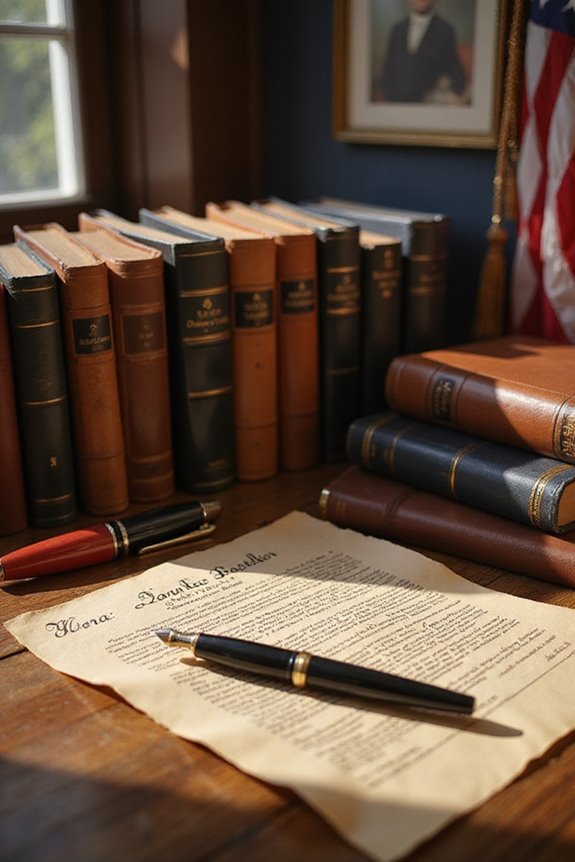To choose a political book effectively, we should consider several key factors:
- Identify Genres: Recognize the type of political book, such as political fiction, philosophy, or history.
- Evaluate Authors: Check their qualifications, publication records, and ideological alignment.
- Assess Content Clarity: Look for well-organized sections, clear headings, and logical flow.
- Consider Our Interests: Align book topics with our current political context and personal interests.
By following these steps, we can make informed choices and enhance our political understanding.
Key Takeaways
- Identify your purpose: Determine whether you seek historical context, current analysis, or theoretical exploration to guide your selection.
- Assess author credentials: Look for educational background, professional affiliations, and publication records to ensure credibility and expertise.
- Evaluate content structure: Choose books with clear organization, headings, and logical sequencing to enhance comprehension and retention of information.
- Consider current political contexts: Align your choice with contemporary events and theories to ensure relevance and engagement with ongoing debates.
- Match complexity to your knowledge level: Select books that suit your understanding of political topics to promote effective learning and engagement.
Understanding Different Types of Political Books
When we think about political books, how do we determine which type best suits our interests and needs? Understanding the various political genres is essential for effective thematic exploration. Here are some key categories:
- Political Fiction: This genre uses storytelling to critique political events, featuring subgenres like satire and dystopian fiction. Examples include Orwell’s *Nineteen Eighty-Four*.
- Political Philosophy: These texts examine foundational questions about justice and power, often serving as gateways to different ideologies. Works like Sandel’s *Justice* are notable.
- Political Science: Textbooks in this genre offer systematic studies of political systems and behaviors, emphasizing empirical research. Some resources are organized into subcategories by country to enhance thematic navigation. Additionally, historical context is crucial in understanding how political theories have evolved over time.
- Political History and Biography: These books provide context for contemporary debates by exploring historical events and influential figures.
- Political Ideologies: This category focuses on distinct theories, essential for analyzing political conflicts.
Understanding these categories helps us choose the right book for our political interests.
Evaluating Author Credentials and Perspectives

Evaluating an author’s credentials and perspectives is essential in selecting a political book that resonates with our interests. When we assess an author, we should consider the following:
- Author Qualifications: Their educational background in political science or related fields enhances credibility. Authors with a strong foundation in historical analysis can provide a richer context to their arguments.
- Professional Affiliations: Connections with recognized institutions indicate expertise and authority.
- Publication Record: Works published in peer-reviewed journals signal scholarly recognition.
- Ideological Alignment: Identifying the author’s political affiliations helps contextualize their viewpoint.
- Previous Works: Reviewing earlier writings can reveal consistency in their political stance. Additionally, an author’s expertise in specific subjects can provide deeper insights into their analysis and arguments.
Assessing Content Structure and Clarity

How do we guarantee that a political book presents its ideas effectively? First, we should assess its content organization and chapter flow. A well-structured book features clearly defined chapters and sections, which help us comprehend complex ideas.
- Look for clear headings and subheadings that guide us through the argument.
- Summaries or conclusions at the end of each chapter reinforce key messages, aiding retention.
- Logical sequencing allows for a progression from foundational concepts to advanced analysis.
- Consistent terminology helps maintain coherence throughout the text, avoiding confusion.
Additionally, effective connections between topics enhance clarity. By evaluating these elements, we can better understand the author’s thesis and the overall narrative of the political book we’re considering. Notably, a book like “The Analysis of Political Structure” demonstrates the importance of a holistic systems analysis approach in political research. Furthermore, examining how media influence shapes political narratives can provide additional context to the arguments presented in the book.
Reviewing Source Quality and Supplementary Materials

Evaluating the quality of sources and supplementary materials in a political book is essential for understanding its reliability and depth. Here are some key factors to examine:
- Source Credibility: Assess the author’s expertise in political science and the reputation of the publisher. Recognized academic presses often guarantee quality. PSR Book Review Policy highlights the importance of peer-reviewed materials, which can further enhance source credibility. Additionally, comprehensive references such as The Oxford Handbook of Political Science can provide a solid foundation for further inquiry.
- Citations and References: Look for well-documented citations and a robust bibliography that supports the author’s assertions.
- Supplemental Resources: Check for appendices or endnotes that provide additional data, enhancing the main text’s arguments.
- Critical Reviews: Seek out peer reviews or critiques in academic journals to gauge the book’s scholarly impact.
- Bias and Limitations: Evaluate whether the book acknowledges potential biases or limitations in its arguments, guaranteeing a balanced presentation.
Considering Reader Purpose and Engagement

When we consider the purpose behind our reading choices, it greatly influences our engagement with political books. Identifying reader motivations helps us select the right material. For example:
- Informational vs. Analytical: Understanding whether we seek historical context or current analysis shapes our choice. Engaging with political theories presented in various styles can also enhance comprehension.
- Content Relevance: Books addressing local, national, or international politics align better with our focus.
- Depth and Complexity: Knowing our knowledge level allows us to gauge suitable complexity, ensuring comprehension without overwhelming us. Academic libraries utilize various acquisition mechanisms, which can inform our selection process as well.
Utilizing engagement strategies can also enhance our experience:
- Readability Factors: Clear language and organized structure maintain interest.
- Interactive Elements: Discussion questions and visual aids encourage active participation.
Utilizing Academic and Library Resources
Utilizing academic and library resources effectively can greatly enhance our selection of political books. Here’s how we can leverage these tools:
- Academic Journals: These provide peer-reviewed articles, ensuring content accuracy and authority. They help us understand current political discourse and trends.
- Library Databases: Accessing extensive databases allows us to evaluate the depth and breadth of political topics covered in potential books. This is important because comprehensive written policy guides informed choices in resource selection.
- Reviews and Ratings: Many databases include reviews from established sources, guiding our selection process based on credibility and relevance.
- Publisher Reputation: Focusing on university presses can also inform us about the book’s reliability.
Identifying Your Political Interests
How can we pinpoint our political interests effectively?
- Assess Political Preferences: We should consider what topics resonate with us personally. Are we drawn to social issues, economic policies, or environmental concerns?
- Evaluate Issue Salience: Understanding the significance of these topics in our lives helps clarify our interests. For instance, if health care impacts us directly, it may hold higher salience. Additionally, political leaners may have varying perspectives on issues, which can enhance our understanding of our own preferences.
- Engagement Levels: Think about how often we consume political news, participate in discussions, or engage with organizations. This can indicate our overall political interest.
- Identify Key Issues: We can explore clusters of topics that align with societal debates, such as civil rights or climate change. This process narrows down potential political books that reflect our interests.
Recognizing Current Political Contexts
Recognizing the current political contexts is essential for understanding the landscape in which we find ourselves today.
- Current events, such as the ongoing Ukraine conflict and instability in the Middle East, shape global geopolitical dynamics.
- Political trends, including the rise of nationalism and protectionism, impact international cooperation and economic growth.
- The US-China rivalry extends beyond trade, adding layers of complexity to global relations.
- Experts rank state-based armed conflict and geoeconomic confrontations as top risks for 2025, highlighting the urgency of these issues.
- Additionally, climate change and its political implications demand our attention, as extreme weather events increasingly influence policy discussions. Electoral trends indicate a significant global shift, as many countries are experiencing declines in democratic performance.
Staying informed about these developments helps us select political books that reflect our evolving world.
Exploring Political Theories and Philosophies
What do we truly understand about the diverse political theories and philosophies that shape our world today?
- Liberalism Evolution: Initially focused on individual freedom, it has transformed into a modern framework that emphasizes social justice and government intervention.
- Socialism Principles: Advocates for collective ownership and resource redistribution to achieve economic equality and social justice.
These theories provide insight into the relationship between the state and individuals, examining the role of authority and governance. By studying political institutions and key concepts like justice, we can better appreciate how these ideologies influence contemporary politics. Engaging with various political philosophies allows us to grasp the complexities of governance and the dynamics of power in our society today. Additionally, understanding the historical context and evolution of political philosophy is crucial as it reveals how different political ideologies have emerged and influenced modern governance.
Frequently Asked Questions
How Do I Find Politically Themed Fiction Books?
Imagine wandering through a vibrant forest of fiction genres, where political themes bloom like wildflowers. We can explore curated lists, award winners, and literary reviews to uncover narratives that spark our curiosity and engagement.
Are There Graphic Novels Focused on Political Topics?
Absolutely, there’re graphic novels with compelling political themes. For our recommendations, we suggest *March*, *Persepolis*, and *Woman, Life, Freedom*. Each one explores significant issues, making them essential reads for anyone interested in politics through art.
What Are Some Classic Political Books Everyone Should Read?
As we wander through the vast library of political thought, classic influences beckon us. Essential readings like *The Republic* and *The Communist Manifesto* illuminate our path, helping us grasp the intricacies of power and society.
How Can I Determine a Book’s Bias Before Reading?
To determine a book’s bias, we should consider the author’s background and how media representations influence their perspective. Analyzing their experiences and the framing of issues can help us identify potential biases before reading.
Are There Book Clubs Focused on Political Literature?
There’re vibrant political book clubs, where we gather, discussing politics passionately, juxtaposed against solitary reading. From local meetups to online platforms, we connect over essential topics, diving deep into the fabric of democracy and liberation.







